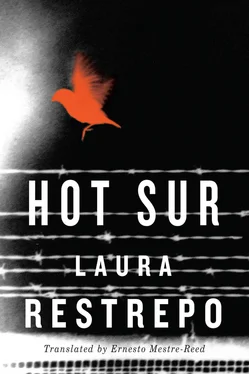Perhaps that is why I yearn for those years in the Andes, where life took place at such an astounding height above sea level and was a hazardous endeavor. Maybe that’s why I can again taste the arequipe in my mouth, the smoky, ambrosial candy the Colombian servants used to give me out of sight from my mother, who had forbidden me to eat anything sugary. But of all these memories, the best by far is of María Aleida, a beautiful black woman who had been crowned regional Queen of the Currulao in her hometown, and who was the nanny who cared for me in Bogotá. I never learned how to dance the currulao , but there was no doubt in my mind that María Aleida was the most beautiful woman in the world, and not only that, but she had the habit of calling others “my love,” which deeply unsettled me. My love this, my love that. Could this mean that María Aleida was in love with me? Was such a thing possible — that my shy skinny ass could attract the Queen of the Currulao, who was ten years older than me and more strikingly beautiful than I could have imagined?
The situation was confusing, hard to interpret, because I wasn’t the only one María Aleida called “my love.” She called everyone in the Rose family that. And what was already complicated became even more so when I heard María Aleida gossiping about my father in the kitchen. I was spying on her — I was always spying on her — and she was telling the other employees that my father must have worked for the CIA, because all gringos who lived in Colombia worked for the CIA even though they might masquerade as diplomatic engineers. I was hidden behind a cabinet, and the news surprised me. Not that it made me lose respect for my father; on the contrary, my admiration for him grew, or at least it made him more interesting. I liked thinking of him as a spy and not an engineer. It wasn’t true, of course, all that CIA stuff, just gossip that María Aleida only dared whisper behind my father’s back, while to his face she called him “my love,” the same way she did everyone else. Álvaro Salvídar, the chauffeur, was for María Aleida “my love,” or “my precious,” and also “doll,” terms she also used with me. She called Anselma, the cook, “my love” and “my darling,” like she did my mother, who was her principal darling.
I think I miss being someone’s love and precious and doll. And how beautiful María Aleida looked when she went barefoot to teach me how to dance salsa or merengue, mocking my clumsiness and my lack of rhythm, not like that, doll, look, like this, like this, my dear, she showed me, swaying her hips, and me, paralyzed with love, incapable of following her lead. Aside from all the other names María Aleida also called me “mi negro,” which in Colombia is a term of endearment that could apply to anyone regardless of skin color. Maybe she called everyone else “my love,” but I was the only one she called “mi negro,” despite the fact that my skin was so white that it’s almost transparent. My mother would have panic attacks any time I went out to play in the garden without a shirt or sunscreen, because you’re going to fry alive, she said. Thinking about it later, such a horrible threat, frying alive, maybe that’s where my fear of burning to death comes from. “Come put your shirt on, Cleve, you’re going to fry alive,” my mother screamed at me from the window, and I went back into the house feeling vulnerable, ridiculously underage. On the other hand, I felt a sense of triumph and strength when María Aleida called me “mi negro.” Me, the Great Mi Negro, King of the Jungle and the Currulao, whom the beautiful María Aleida secretly loved. And soon my mother and I returned to Chicago, and there were no more suicidal trucks in the chasms of fog, no penetrating smell of green, no shots of adrenaline from machete duels, no “my love” learning to dance the salsa, no maracuya either, or guanabana or arequipe, and most importantly never, never again the spectacular María Aleida calling me “mi negro.”
One of the students in my writing classes in Manninpox is a striking young woman. The truth is that I started paying more attention to her when I realized she was Colombian. I think she immediately brought to mind María Aleida. It occurred to me that her pretty face must be similar to María Aleida’s, her smile and her hair like María Aleida’s, and above all the color of her skin. I couldn’t help imagine the prisoner free, far from Manninpox, back home in Colombia, dancing salsa and whipping up arequipe in a copper pot with a big wooden spoon.
Interview with Ian Rose
Aside from the scrawls composed in the dark, the manuscript from the person who wanted to be known as María Paz was written in very clear handwriting, as if from a printer, the type of handwriting of someone who wants to be understood, and yet Ian Rose had trouble figuring out the additions compressed into the margins and the arrows that pointed to where the passages belonged. There were also pages missing, seventeen in all; the page numbers on the upper right hand corner every so often skipped a number. Where had the manuscript been during its journey looking for its match? How many hands had it passed through before reaching Ian Rose’s? Why had there been such delays? And why did Socorro finally decide to send it? What had become of the seventeen missing pages, perhaps lost but probably confiscated? Rose didn’t know. What he did know was that the pink paper, the type adolescents use to write notes, brutally contrasted with what was written on it. It wasn’t a love letter at all, although at times it appeared to be. The author was apparently a young Latina, Colombian it seemed. And Ian Rose did not have to read long to understand that she was a prisoner in Manninpox, from where she wrote the story of her life to send it to the teacher of the writing workshop that had been offered for the inmates. That person was no other than his son, Cleve, and it just so happened that Manninpox was only ten minutes away from the house in the mountains. Which wasn’t a coincidence, after all — the reason Cleve had volunteered to teach there and not at some other state prison was because it was so close. There is no such thing as coincidence — just as it wasn’t coincidence that of all the prisoners with whom Cleve dealt, he became close with one who was Colombian. Apparently, the Andes had left more of a mark on him than his father had imagined.
Tearing into that package had been like opening Pandora’s box: hordes of phantoms escaped and perched on Ian Rose’s shoulder to stay. Each one of the lines written by that young woman directly or indirectly spoke to him of Cleve, and reading and rereading those lines offered an opportunity to discover things about his son’s life that he had never known. About his life and about his death. Here and there, Ian Rose thought he found signs, real or imagined, that the author had some connection to Cleve’s death. Some link, although Rose wasn’t exactly sure what. But she had to know something, even if she had written this before Cleve died, even if she had written it thinking that he was still alive, although in fact he may have already been dead without her knowing it. She must have known something, and Ian Rose sifted through those pages like an archaeologist looking for some clue.
The young woman even mentioned an incident that he was familiar with: Cleve had struck a bear on his motorcycle one moonless night when he was returning from the prison through the woods. Nothing had happened to him that time, miraculously, and apparently nothing serious had happened to the bear. Back home, when he had settled down a bit, he told his father what had happened. He said it had been very dark and after a forceful blow he ended up laid out on the road, stunned, confused, not sure what invisible and supernatural force had come over him and made him roll on the ground. Until he saw the black mass a few feet away. It was the bear, getting up, apparently unhurt as well and going into the woods. The following morning, during breakfast, the two Roses took up an old discussion. As he had done many times, the father insisted that the son buy a car. He’d give him the money. He wouldn’t take it? Fine, then he could have his mother’s Toyota. Every time Edith stayed in her ex’s house, she’d leave some item behind before departing, as if to assert ownership over that place although she had never lived there. Among the things that she had bequeathed, there were the dog Otto, the cello, and a red Toyota, all of which Rose had taken in lovingly and cared for with special deference, as if they were a promise that one day their owner would come back to stay.
Читать дальше












